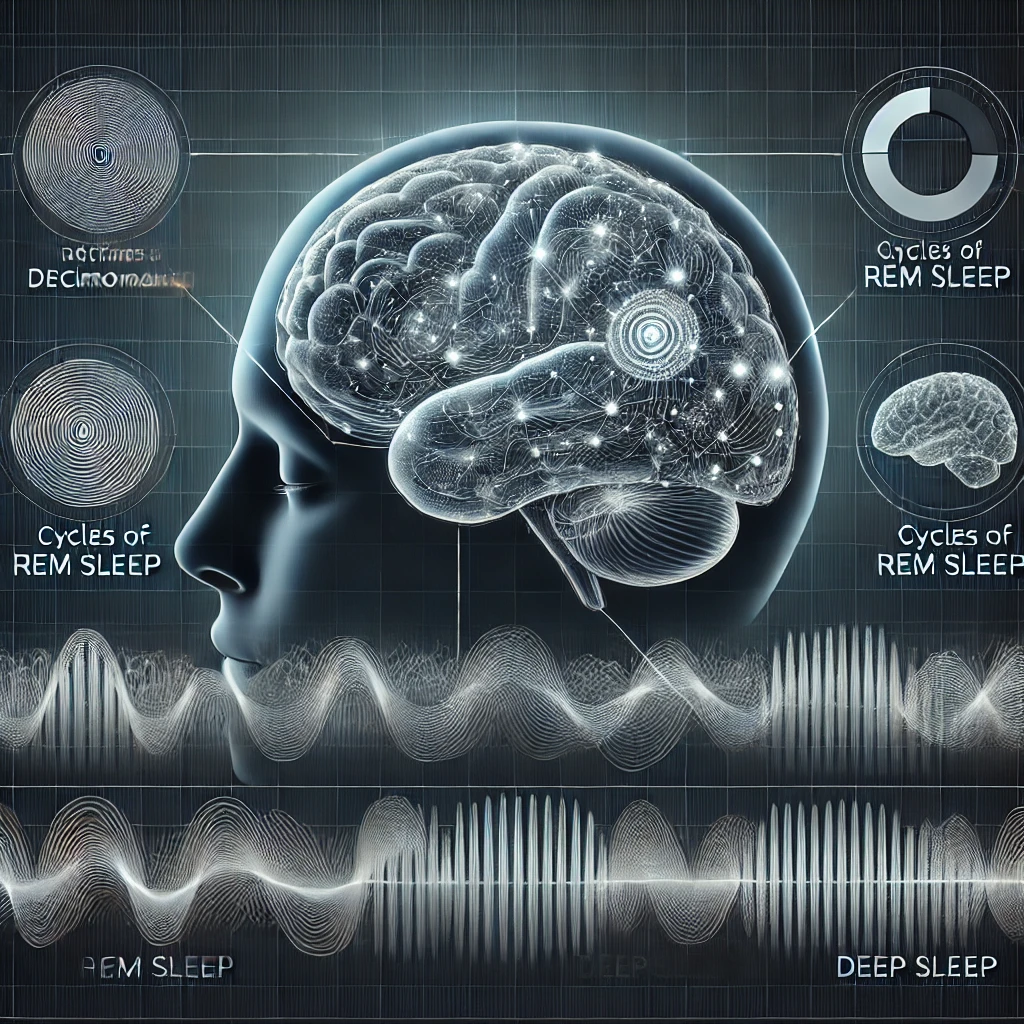Introduction
Have you ever stopped to think that the secret to being more productive may lie in something as simple as getting a good night’s sleep? Sleep is one of the fundamental pillars of executive health and has a direct impact on your ability to make decisions, lead effectively and maintain energy throughout the day. Although sleep is often neglected in the busy lives of many leaders and professionals, the studies are clear: improving the quality of your sleep can dramatically increase your productivity, health and well-being.
In this article, we’ll explore how a good night’s sleep is essential for the optimal functioning of the body and mind, and how you can integrate healthy habits to ensure that each day starts with the energy and focus you need. Plus, we’ll dive into the science behind sleep, including its role in the circadian cycle and how it affects decision-making and physical and mental performance.
Part 1: Straight to the Point 🎯 – Basic Strategies and Practical Actions
Part 1, “Straight to the Point”, offers practical instructions and suggestions for immediate action.

Practical Tips to Improve Your Sleep and Increase Productivity
For leaders and executives whose days are full of challenges and important decisions, optimizing sleep is an essential strategy for maximizing productivity. With a few simple changes to your daily habits, you can ensure a much better quality of sleep, which will bring significant results in your health and performance.
1. Maintain a Fixed Sleep Routine
One of the best ways to improve your sleep is to create a regular routine. Waking up and going to sleep at the same time every day helps to regulate your biological clock. This is crucial for keeping the body in harmony with the natural cycle of light and dark. When you establish consistent bedtimes, your body adapts, allowing you to fall asleep more quickly and have a deeper sleep.
How to apply
- Set a fixed time to go to bed, even on weekends.
- Wake up at the same time every day, regardless of how many hours you’ve slept.
- Avoid long naps during the day, which can interfere with night-time sleep.
2. Create a Sleep-Friendly Environment
The environment in which you sleep plays a huge role in the quality of your sleep. An ideal bedroom should be quiet, dark and have a pleasant temperature. Using blackout curtains, eliminating noise and reducing exposure to artificial light before bed can help create the perfect climate for a good night’s sleep.
How to apply
- Use heavy curtains to block out outside light.
- Keep the bedroom temperature between 18-22°C.
- Use a white noise machine or earplugs to block out unwanted sounds.
3. Disconnect from electronic devices
Our brains are sensitive to the blue light emitted by cell phone, tablet and computer screens. This light interferes with the production of melatonin, the hormone responsible for helping us sleep. Disconnecting from screens an hour before going to bed can make a big difference to how easy it is to fall asleep and the quality of your sleep.
How to apply
- Avoid using electronic devices at least 1 hour before bedtime.
- If you have to use your cell phone or computer at night, turn on “night mode” or use blue light filters.
- Replace screen time with relaxing activities, such as reading a book or practicing meditation.
4. Take Care of Your Diet and Avoid Stimulants at Night
Taking care of your diet at night can have a big influence on the quality of your sleep. Avoiding heavy meals, alcohol and caffeine in the hours before sleep is crucial to prevent indigestion and increased alertness. In addition, opting for foods that promote relaxation can prepare the body for rest.
How to apply
- Avoid heavy meals, alcohol and caffeine in the 3-4 hours before bedtime.
- Opt for foods rich in tryptophan, such as bananas, nuts and oats, which help promote relaxation.
- Drink an infusion of relaxing herbs, such as chamomile or lemon balm.
5. Practice Relaxation Techniques Before Going to Sleep
Incorporating relaxation techniques such as meditation, deep breathing or light stretching before bed can reduce levels of cortisol, the stress hormone that often keeps people awake. These methods calm the mind, signaling to the body that it’s time to rest.
How to apply
- Try guided meditation or breathing techniques to calm the mind.
- Do gentle stretches to release muscle tension built up during the day.
- A warm bath before bed also helps to relax and prepare the body for sleep.
With these practical tips, you’ll be well on your way to improving the quality of your sleep and, consequently, your day-to-day productivity. Now that we’ve covered the practical actions, how about exploring the scientific side of this issue? Sleeping well not only improves physical and mental performance, but also regulates fundamental processes in the body. Let’s understand this in more depth, shall we?
Part 2: Explaining the Concept Cientificamente👨🏻🔬 -Deepening your knowledge
Part 2, “Explaining the Concept Scientifically”, provides a scientifically-based in-depth look at the “whys” and explains in more detail the suggestions made in Part 1

How Sleep Affects the Body and Mind
Now that you have practical tips for improving the quality of your sleep, let’s explore the scientific side and understand how sleep impacts essential functions of the body and mind. Sleep plays a vital role in productivity, executive health and general well-being. Several studies highlight that inadequate sleep can affect everything from cognitive function to metabolism.
The Circadian Cycle: The Body’s Internal Clock
Sleep is regulated by the circadian cycle, which is the body’s biological clock responsible for regulating the 24-hour cycle of sleep and wakefulness. This internal clock responds to light and darkness, which means that when we expose ourselves to natural light in the morning and avoid bright lights at night, we help regulate sleep. The suprachiasmatic nucleus, located in the brain, controls this cycle and synchronizes the body with the external environment.
The Importance of Exposure to Natural Light
Exposure to natural light during the day is fundamental for adjusting the circadian cycle, promoting a state of alertness during the day and facilitating sleep at night. Morning sunlight, in particular, helps suppress melatonin, allowing us to feel more awake and productive.
A Harvard Medical School study shows that exposure to natural light can increase productivity by up to 15%, as well as improving mood and concentration. On the other hand, a lack of natural light during the day, combined with exposure to artificial light at night, can confuse the circadian cycle and impair sleep quality.
The Role of Melatonin and Cortisol
Two hormones play essential roles in regulating the sleep cycle: melatonin and cortisol.
- Melatonin: This hormone is produced by the pineal gland when the environment begins to darken. Melatonin is essential for preparing us for sleep, signaling to the brain that it’s time to rest. When melatonin production is suppressed (for example, by exposure to blue light from electronic devices at night), this can result in insomnia or poor quality sleep.
- Cortisol: Known as the stress hormone, cortisol peaks in the morning, helping us to wake up and stay alert during the day. However, high levels of cortisol at night can make it difficult to sleep. Chronic stress is one of the factors that increases cortisol production, disrupting the circadian cycle and impairing the ability to fall asleep.
Sleep and Cognitive Performance
One of the clearest effects of insufficient sleep is a drop in cognitive performance. Sleep deprivation affects areas of the brain responsible for memory, attention and decision-making. In corporate environments, where leaders and executives need to be at peak performance at all times, inadequate sleep can compromise mental clarity and the ability to lead effectively.
Sleep Deprivation Studies
Studies show that even a slight reduction in the amount of sleep can negatively impact cognitive function. In research published in the Journal of Neuroscience, it was found that individuals who sleep less than 6 hours a night experience a significant drop in problem-solving ability, reaction time and decision-making. This impact is especially damaging for executives who need attention and focus to make strategic decisions and lead teams.
In addition, sleep deprivation decreases creativity and the ability to innovate, which is essential in competitive business environments. Sleep, especially REM sleep, is crucial for consolidating memories and processing complex information.
Sleep and Physical Health: The Metabolism Connection
Sleeping well is also essential for physical health. Sleep plays an important role in metabolism, appetite regulation and weight control. When we sleep, the body goes through processes of cell repair, immune system maintenance and hormone regulation.
Sleep and weight control
A good night’s sleep regulates hormones related to appetite, such as leptin and ghrelin. Leptin is the hormone that makes us feel satisfied after a meal, while ghrelin is the hunger hormone. When we sleep too little, leptin production decreases, while ghrelin increases, leading to increased hunger and often a craving for foods high in sugar and fat.
A study published in the Journal of Clinical Endocrinology & Metabolism found that individuals who sleep less than 5 hours a night have a significantly higher risk of developing obesity. This is worrying because excess weight can lead to a series of other health problems, such as heart disease and diabetes.
Sleep and muscle recovery
As well as regulating metabolism, sleep is essential for muscle recovery and physical performance. During deep sleep, the body releases growth hormones that help repair tissue and build muscle. This process is particularly important for those who exercise regularly or who lead a highly active lifestyle.
REM (Rapid Eye Movement) sleep is also important for mental and emotional recovery. During this phase of sleep, the brain processes emotions and experiences, helping to reduce stress and improve mood.
Conclusion
Quality sleep is one of the most powerful tools for optimizing your health, productivity and well-being. As we’ve seen, it plays a crucial role in regulating the circadian cycle, hormonal balance, cognitive performance and physical recovery. Improving your sleep habits can be the first step towards a more balanced and productive life, both in the workplace and in your general health.
For executive leaders who face intense daily challenges, ensuring a good night’s sleep is not just a matter of well-being, but a smart strategy for maximizing performance. So follow the practical tips discussed here and make sleep a priority.
Be proactive in creating a sleep-friendly environment and adjust your daily habits to support your natural circadian cycle. Remember: good sleep is not a luxury, it’s a necessity. Do it for your productivity and executive health!

Kelton Tartarotti, a specialist in Health, Longevity and Lifestyle Reprogramming, brings an innovative approach to corporate and personal well-being in the Tartarotti Report. With a comprehensive background in Physical Education, including a BA, BSc and post-graduate studies in the Physiological Basis of Personalized Training and Sports Nutrition, Kelton has a solid foundation in sports and health sciences.
He is registered with the Regional Council of Physical Education (CREF-ES) under number: 005334-G/ES
His experience includes:
International certification as a Personal Trainer by the World Fitness Association (Florida/USA)
Coaching training by ABRACOACH
Specialization in Integrative Functional Health
15 years as a physical trainer for elite MMA athletes in world events
Working as a Physical Trainer at the Espírito Santo Olympic Center (COES)
In the Tartarotti Report, Kelton offers valuable insights into:
Scientifically-based executive health protocols
Stress management and resilience techniques for leaders
Sleep optimization strategies for cognitive performance
Functional nutrition adapted to corporate life
Efficient exercise programs for busy schedules







